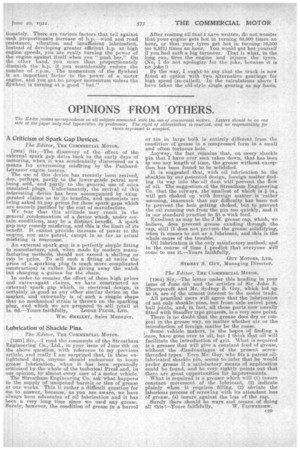OPINIONS FROM OTHERS.
Page 29

If you've noticed an error in this article please click here to report it so we can fix it.
The atifor invites correspondence on all subjects connected with the use of commercial itioOrs. Letters should be on one side of the paper only and typewritten by preference. The right of abbreviation is reserved, and no responsibility for views expressed is accepted.
A Criticism of Spark Gap Devices.
The Editor, THE COMMERCIAL MOTOR.
[1964 Sir,—The discovery of the affect of the external spark gap dates back to the early days of motoring, when it was accidentally discovered as a means for overcoming misfiring by the PanhardLevassor engine testers.
The use of this device has recently. been revived, due; perhaps, partly to the lower-grade petrol now being sold,and partly to the general use of mica insulated plugs. Unfortunately, the revival of this interesting device has been accompanied by exaggerated claims as to its benefits, and motorists are being asked to pay prices for those spark gaps which are scarcely justified by the cost of manufacture.
We fear that this attitude may. result in the general condemnation of a device which, under certain conditions, may be a distinct benefit.A spark gap may remedy misfiring, and this is the limit of its benefit. It cannot provide increase of power to the engine, nor save petrol, except in so far as actual misfiring is overcome.
An external spark gap is a perfectly simple fitting to manufacture, and, when made by modern manufacturing methods, should not exceed 4 'shilling or two in price. To sell such a .fitting at twice the price of a sparking plug (a .much more complicated construction) is rather like giving away the watch but charging a guinea for the chain.
In order to counter the effect of these high prices and extravagant claims, we have constructed an external spark gap which, in electrical design, is certainly as good as any other similar device on the market, and externally is of such a simple shape that no mechanical strain is thrown an the sparking plug, and which we are prepared to sell retail at is. 6d.—Yours faithfully, LODGE PLUGS, LTD.
WM. SHELLEY, Sales Manager.
Lubrication of Shackle Pins.
. The Editor, THE COMMERCIAL MOTOR.
[1963] Sir,—I read the comments of the Streatham Engineering Co., Ltd., in your issue of June 6th on the above question, with rekrence to my previous article, and really I am surprised that, in these enlightened days, anyone should endeavour to boom grease lubrication, when it has been repeatedly criticised by the whole of the technical Pre g and., in our opinion, by almost every user of a motor vehicle.
The StreathamEngineering Co. -ask what happens to the supply of unopened barrels or tins of grease at our works. This it rather a difficult question felme to answer, because, as you are aware, we have always been advocates of oil lubrication and it ha-s been a very long time since we used any grease. Surely, however, the condition of grease in a barrel
or tin in large bulk is entirely different from the condition of grease in a compressed form in a small andoften tortuous hole.
Anyway, the fact remains that, on every shackle pin that I have ever seen taken down, that has been in use any length-of time, the grease without exception has been found to be solidified.
It is suggested that, with oil lubrication to the shackles by our patented design, foreign matter finding its way into the oil duct will prevent the fiow of oil. The suggestion of the Streatham Engineering Co. that the oilways, smallest of which is will get choked up with foreign matter is rather amusing, inasmuch that our difficulty has been not to prevent the hole getting choked, but to prevent the oil running out from the pin too quickly, and it is our standard practice to fit a wick feed.
Excellent as may be the J.M. grease cap, which, we believe, does prment grease exuding through the cap, still if does not prevent the grease solidifying, when it ceases to act as a lubricant, and this is the whole cause of the trouble.
Oil lubrication is the only satisfactory method, and in the course of time I predict that everyone Will come to use it.—Yours faithfully, GUY MOTORS, LTD.
SYDNEY' S. GUY, Managing Director.
The Editor, THE COMMERCIAL MOTOR.
[19641 Sir,—Tho letter under this heading in your issue of June 6th and the articles of Sir John E. Thornycroft and Mr. Sydney S. Guy, which led up to it, are of the utmost interest to the motor trade. All practical users will agree that the lubrication of not only shackle pins, but front axle swivel pins, ball joints, and, in fact, all those parts now usually fitted with Stauffer type greasers, is a very sore point. There is no doubt that the grease does dry or congeal in the grease way, no matter whether air or the introduction of foreign matter be the Cause. Some vehicle makers, in the hopes of finding a ;cure, have gone over to oil, but I think that oil will facilitate the introduction of grit. What is required is a greaser that will give a constant feed of grease, without the disadvantages of the present screwthreaded types: Even Mr. Guy, who fits a patent oillubricated shackle pin, seems to infer that he would prefer grease if a satisfactory means of application could be found, and he very rightly points out that there are great opportunities for improvements. What is required is a greaser which will (1) insure constant movement of the lubricant, (2) indicate plainly when it requires filling, (3) obviate the laborious process of screwing with its attendant loss of grease, (4) insure against the loss of the cap. Surely there should be. ways and means of doing
all this !—Yours faithfully, W. FLOwERDE-w.
































